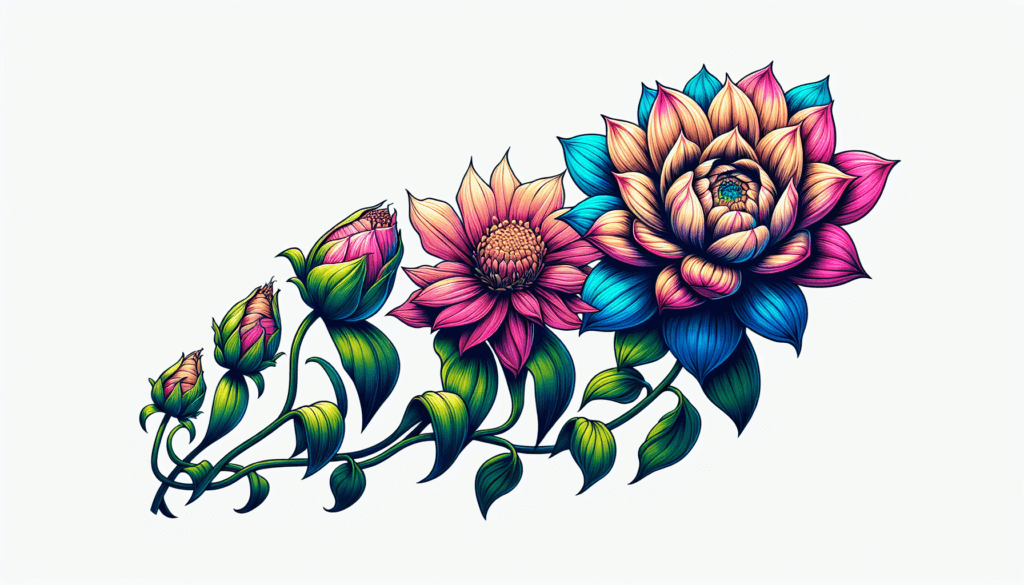You’re never too old to embrace the wonderful journey of getting older. In this article, we’ll explore the mindset and lifestyle changes that can help you navigate this phase of life with grace and enthusiasm. From embracing new experiences to prioritizing self-care, we’ll share valuable insights on how to make the most of every precious moment. So, grab a cup of tea, sit back, and let’s celebrate the beauty of aging together.

Accepting the Aging Process
Understanding the inevitability of aging
As you journey through life, it’s important to acknowledge and accept the natural process of aging. No matter how much we may wish to turn back the clock, aging is an inevitable part of life. As time goes by, our bodies and minds go through changes, and it’s crucial to understand and embrace this reality. By accepting the aging process, you can develop a healthier perspective that allows you to focus on the positive aspects of growing older.
Changing societal perceptions
Society’s views on aging have evolved significantly over the years. Gone are the days when aging was viewed as a decline or a negative aspect of life. In today’s world, there is a growing appreciation for the wisdom, experience, and unique perspective that come with age. Embracing a more positive and inclusive attitude towards aging can help challenge stereotypes and promote a more inclusive and age-friendly society.
Recognizing the benefits of getting older
While it’s natural to focus on the physical and mental challenges that come with aging, it’s essential to also recognize the many benefits of growing older. With age comes a wealth of knowledge, life experience, and personal growth. You gain a greater sense of self-awareness, resilience, and emotional intelligence. Embracing these benefits can help foster a sense of gratitude and appreciation for the aging process.
Maintaining Physical Health
Staying active and exercising regularly
Engaging in regular physical activity is one of the most important things you can do to maintain your physical health as you age. Regular exercise helps to strengthen your muscles, improve cardiovascular health, increase flexibility, and enhance overall well-being. Whether it’s walking, swimming, dancing, or any other form of exercise that you enjoy, finding ways to stay active can greatly contribute to your overall health and vitality.
Eating a balanced and nutritious diet
A well-balanced and nutritious diet is another crucial component of maintaining physical health as you age. As you get older, your nutritional needs may change, and it’s important to adapt your diet accordingly. Aim to include a variety of fruits, vegetables, whole grains, lean proteins, and healthy fats in your daily meals. Avoiding processed foods and sugary snacks can also help keep your energy levels stable and support optimal health.
Getting enough sleep and rest
Getting sufficient amounts of quality sleep is essential for your overall health and well-being. As you age, your sleep patterns may change, and it’s important to prioritize restful sleep. Create a sleep routine that allows for adequate rest and relaxation. Practice good sleep hygiene by avoiding caffeine and electronic devices before bedtime, and creating a calm and comfortable sleep environment. Remember, quality sleep is essential for your physical and mental rejuvenation.
Managing stress and mental health
Taking care of your mental health is just as important as maintaining your physical health. Chronic stress can take a toll on your well-being, and as you age, it’s crucial to develop healthy coping mechanisms to manage stress. Explore stress-relief techniques such as meditation, deep breathing exercises, or engaging in activities that bring you joy and relaxation. Seeking professional help or counseling can also be beneficial in managing stress and promoting mental well-being.

Cultivating Emotional Well-being
Developing a positive mindset
Developing a positive mindset is an important aspect of emotional well-being. As you age, it’s easy to fall into negative thinking patterns or dwell on the limitations that come with getting older. However, by consciously focusing on the positive aspects of your life and practicing gratitude, you can cultivate a more optimistic outlook. Remind yourself of the many blessings and opportunities that come with age, and embrace a positive attitude towards the future.
Practicing gratitude
Gratitude is a powerful tool for promoting emotional well-being. Take a moment each day to reflect on and appreciate the things you are grateful for. This can be as simple as appreciating the beauty of nature, cherishing relationships, or expressing gratitude for your health and well-being. By practicing gratitude, you can shift your focus to the positive aspects of your life and cultivate a sense of contentment and fulfillment.
Building and maintaining relationships
Nurturing social connections is crucial for emotional well-being, especially as you age. Take the time to build and maintain meaningful relationships with friends, family, and loved ones. Engage in regular social activities, such as meeting for coffee, joining clubs or organizations, or volunteering in your community. These connections provide emotional support, companionship, and a sense of belonging, contributing to your overall happiness and well-being.
Engaging in hobbies and interests
As you embrace the aging process, it’s important to continue pursuing your hobbies and interests. Engaging in activities that bring you joy and fulfillment can greatly enhance your emotional well-being. Whether it’s gardening, painting, playing a musical instrument, or any other activity that you enjoy, allocating time for your passions can provide a sense of purpose and satisfaction.
Intellectual Stimulation
Continuing to learn and acquire new skills
Continuing to learn and acquire new skills is key to keeping your mind sharp and staying intellectually stimulated as you age. Consider taking up new hobbies, attending workshops or classes, or pursuing further education. Engaging in learning opportunities not only expands your knowledge but also challenges your brain, helping to improve cognitive function and memory.
Engaging in brain exercises and puzzles
Just like physical exercise is essential for maintaining physical health, brain exercises are important for cognitive well-being. Engage in activities that require mental effort, such as crossword puzzles, Sudoku, or brain-training apps. These exercises help keep your brain active, improve memory retention, and promote overall cognitive function.
Exploring new hobbies and interests
While it’s important to continue pursuing existing hobbies and interests, don’t be afraid to explore new ones as well. Trying new activities can provide new experiences, stimulate your mind, and bring a sense of excitement and fulfillment. Whether it’s learning a new language, playing a sport, or trying a new craft, embracing new hobbies and interests can enrich your life and keep your mind engaged.
Staying curious and open-minded
Maintaining a sense of curiosity and open-mindedness is crucial for intellectual stimulation. Embrace a lifelong love of learning, and approach new ideas and experiences with an open mind. Cultivate a sense of wonder and seek out new information, perspectives, and opinions. This not only keeps your mind active but also promotes personal growth and a deepening understanding of the world around you.

Embracing Wisdom and Experience
Valuing the knowledge gained over the years
As you age, it’s important to recognize and value the knowledge and wisdom gained through your life experiences. You have a unique wealth of insights and perspectives that can greatly benefit both yourself and those around you. Embrace your wisdom and take pride in the lessons you’ve learned along the way.
Finding opportunities to share wisdom
One of the most fulfilling aspects of growing older is the opportunity to share your wisdom with others. Whether it’s through mentoring, volunteering, or engaging in meaningful conversations, seek out opportunities to pass on your knowledge and experiences. Your insights can have a profound impact on younger generations and contribute to a more connected and supportive community.
Mentoring and guiding others
Mentoring and guiding others is a meaningful way to embrace the aging process and make a positive impact. Consider offering your time and expertise to mentor someone in your field or volunteer for organizations that provide mentorship opportunities. Mentoring not only helps others in their personal and professional growth but also provides a sense of fulfillment and purpose as you share your wisdom and experience.
Appreciating the unique perspective that comes with age
As you grow older, you develop a unique perspective on life. Embrace this perspective and appreciate the wisdom that comes with age. Your experiences shape your worldview and offer a valuable lens through which to navigate the world. By embracing and valuing your unique perspective, you can contribute to a greater understanding and appreciation of the complexities of life.
Adapting to Physical Changes
Understanding common age-related changes
As you age, it’s important to understand and anticipate the common physical changes that may occur. Decreased mobility, changes in vision and hearing, and an increased risk of certain health conditions are all common aspects of the aging process. By familiarizing yourself with these changes, you can be proactive in managing your health and seeking necessary support and guidance.
Adopting healthy habits that support well-being
Maintaining your physical well-being requires adopting healthy habits that support your overall health. This includes regular exercise, a nutritious diet, adequate sleep, and stress management. Make conscious choices to prioritize your health and well-being, and seek professional guidance when needed. By adopting healthy habits, you can better adapt to physical changes and optimize your overall quality of life.
Adapting daily routines to accommodate limitations
As you age, it’s important to adapt your daily routines to accommodate any physical limitations you may experience. This may involve making modifications to your living space, using assistive devices or technologies, or seeking support from caregivers or healthcare professionals. By making necessary adjustments, you can maintain your independence and continue to engage in activities that bring you joy and fulfillment.
Seeking professional healthcare guidance
As you navigate the aging process, it’s crucial to seek professional healthcare guidance. Regular check-ups, screenings, and consultations with healthcare providers can help you monitor your health, address any concerns, and proactively manage age-related changes. A healthcare professional can provide personalized recommendations and support tailored to your specific needs, ensuring that you receive the best possible care.

Finding Purpose and Meaning
Reflecting on personal values and passions
Finding purpose and meaning in life involves reflecting on your personal values, passions, and aspirations. Take time to explore what truly matters to you and what brings you joy, fulfillment, and a sense of purpose. This introspection allows you to align your actions and goals with your innermost values, leading to a more fulfilling and meaningful life.
Identifying and pursuing meaningful goals
Setting and pursuing meaningful goals is crucial for maintaining a sense of purpose as you age. These goals can be personal, professional, or related to giving back to your community. Whether it’s learning a new skill, starting a new project, or making a positive impact on others, identifying goals that resonate with you will provide direction and motivation in the journey of aging.
Engaging in volunteer work or community activities
Engaging in volunteer work or participating in community activities is an excellent way to find purpose and meaning in your daily life. Volunteering allows you to contribute your time, skills, and knowledge to causes that you are passionate about. Whether it’s mentoring, supporting charitable organizations, or participating in community events, giving back can bring a sense of fulfillment and make a positive impact on the lives of others.
Creating a sense of purpose in daily life
Ultimately, finding purpose and meaning in the aging process is about creating a sense of purpose in your daily life. This can be achieved by engaging in activities that align with your values, interests, and passions. Whether it’s pursuing a hobby, spending time with loved ones, or dedicating yourself to a specific cause, infusing your daily life with purpose and meaning will bring a greater sense of fulfillment and joy.
Maintaining a Youthful Mindset
Embracing a positive attitude towards aging
Maintaining a youthful mindset involves embracing a positive attitude towards aging. Instead of focusing on the limitations that come with growing older, choose to embrace the opportunities, wisdom, and experiences that age brings. Cultivate a mindset that looks for the positive aspects of getting older, and celebrate the unique journey that each passing year brings.
Avoiding self-limiting beliefs and stereotypes
It’s important to challenge self-limiting beliefs and stereotypes associated with aging. Avoid falling into the trap of thinking that your abilities diminish with age or that you are no longer capable of growth and learning. Remain open to new experiences and opportunities, and believe in your potential to continue evolving and thriving throughout your life.
Focusing on personal growth and development
Just because you’re getting older doesn’t mean you stop growing and developing as an individual. Embrace a mindset of continuous personal growth and self-improvement. Set goals, pursue new interests, and challenge yourself to step outside of your comfort zone. By focusing on personal growth, you can cultivate a sense of vitality and youthfulness in your mind and spirit.
Embracing new technologies and innovations
Technology and innovation are constantly advancing, bringing new possibilities and opportunities into our lives. Embrace these advancements and stay up to date with new technologies that can enhance your daily life. Whether it’s learning to navigate social media, using mobile applications to streamline tasks, or exploring new gadgets and devices, embracing technology can help bridge generational gaps and keep you engaged in a rapidly changing world.

Seeking Support and Connection
Building a support network of friends and family
Maintaining strong relationships with loved ones is crucial for emotional well-being and support as you age. Nurture your connections with family and friends, and make an effort to stay involved in each other’s lives. Building a support network provides a sense of belonging, companionship, and comfort during both the joys and challenges of aging.
Joining social groups or clubs
Joining social groups or clubs that align with your interests is an excellent way to expand your social circle and connect with like-minded individuals. Whether it’s a book club, a sports team, a travel group, or any other community organization, participating in group activities offers opportunities for connection, friendship, and the exploration of shared interests.
Participating in community events
Participating in community events can foster a sense of belonging and connection within your local area. Keep an eye out for events, festivals, fundraisers, or community projects that align with your values and interests. Volunteering or attending these events can provide opportunities to meet new people, engage in meaningful activities, and make positive contributions to your community.
Seeking professional help or counseling when needed
Sometimes, navigating the challenges of aging may require professional help or counseling. It’s important to recognize when additional support is needed and seek assistance from healthcare professionals or therapists who specialize in geriatric care. Seeking help is a sign of strength, and it can provide valuable insights, coping strategies, and support during times of difficulty or transition.
Embracing Self-Care
Prioritizing self-care practices
Self-care is an essential component of overall well-being at any age. Make it a priority to allocate time for activities that nourish and replenish your mind, body, and soul. This may include engaging in hobbies, practicing relaxation techniques, spending time in nature, or indulging in activities that bring you joy and rejuvenation. Remember, self-care is not selfish but rather an investment in your overall health and happiness.
Taking time for relaxation and rejuvenation
In the midst of busy lives, it’s crucial to carve out time for relaxation and rejuvenation. Set aside periods of uninterrupted rest, engage in activities that help you unwind and recharge, and create a calm and soothing environment in your living space. By prioritizing relaxation, you can alleviate stress, improve your overall well-being, and maintain a greater sense of balance and tranquility.
Nurturing physical, mental, and emotional well-being
Self-care involves nurturing your physical, mental, and emotional well-being holistically. This includes engaging in regular physical activity, engaging in activities that stimulate your mind, and addressing your emotional needs. Take time to assess your overall well-being and identify areas that require attention and care. By nurturing yourself on all levels, you can maintain a sense of vitality and thriving throughout the aging process.
Setting boundaries and saying no when necessary
Setting boundaries and learning to say no is a crucial aspect of self-care. As you age, it’s important to be mindful of your limitations and prioritize your well-being. Learn to say no to activities or responsibilities that drain your energy or are not aligned with your priorities. By setting boundaries, you can protect your physical and emotional health and preserve your energy for the things that truly matter to you.


